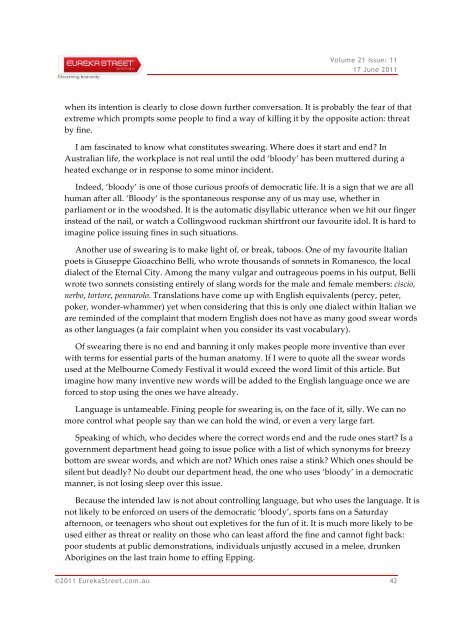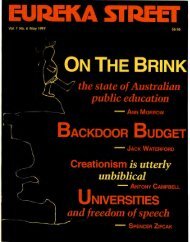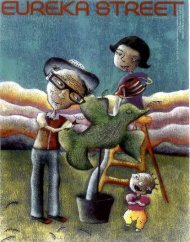17 June 2011 Volume: 21 Issue: 11 Australia's ... - Eureka Street
17 June 2011 Volume: 21 Issue: 11 Australia's ... - Eureka Street
17 June 2011 Volume: 21 Issue: 11 Australia's ... - Eureka Street
You also want an ePaper? Increase the reach of your titles
YUMPU automatically turns print PDFs into web optimized ePapers that Google loves.
<strong>Volume</strong> <strong>21</strong> <strong>Issue</strong>: <strong>11</strong><strong>17</strong> <strong>June</strong> <strong>20<strong>11</strong></strong>when its intention is clearly to close down further conversation. It is probably the fear of thatextreme which prompts some people to find a way of killing it by the opposite action: threatby fine.I am fascinated to know what constitutes swearing. Where does it start and end? InAustralian life, the workplace is not real until the odd ‘bloody’ has been muttered during aheated exchange or in response to some minor incident.Indeed, ‘bloody’ is one of those curious proofs of democratic life. It is a sign that we are allhuman after all. ‘Bloody’ is the spontaneous response any of us may use, whether inparliament or in the woodshed. It is the automatic disyllabic utterance when we hit our fingerinstead of the nail, or watch a Collingwood ruckman shirtfront our favourite idol. It is hard toimagine police issuing fines in such situations.Another use of swearing is to make light of, or break, taboos. One of my favourite Italianpoets is Giuseppe Gioacchino Belli, who wrote thousands of sonnets in Romanesco, the localdialect of the Eternal City. Among the many vulgar and outrageous poems in his output, Belliwrote two sonnets consisting entirely of slang words for the male and female members: ciscio,nerbo, tortore, pennarolo. Translations have come up with English equivalents (percy, peter,poker, wonder-whammer) yet when considering that this is only one dialect within Italian weare reminded of the complaint that modern English does not have as many good swear wordsas other languages (a fair complaint when you consider its vast vocabulary).Of swearing there is no end and banning it only makes people more inventive than everwith terms for essential parts of the human anatomy. If I were to quote all the swear wordsused at the Melbourne Comedy Festival it would exceed the word limit of this article. Butimagine how many inventive new words will be added to the English language once we areforced to stop using the ones we have already.Language is untameable. Fining people for swearing is, on the face of it, silly. We can nomore control what people say than we can hold the wind, or even a very large fart.Speaking of which, who decides where the correct words end and the rude ones start? Is agovernment department head going to issue police with a list of which synonyms for breezybottom are swear words, and which are not? Which ones raise a stink? Which ones should besilent but deadly? No doubt our department head, the one who uses ‘bloody’ in a democraticmanner, is not losing sleep over this issue.Because the intended law is not about controlling language, but who uses the language. It isnot likely to be enforced on users of the democratic ‘bloody’, sports fans on a Saturdayafternoon, or teenagers who shout out expletives for the fun of it. It is much more likely to beused either as threat or reality on those who can least afford the fine and cannot fight back:poor students at public demonstrations, individuals unjustly accused in a melee, drunkenAborigines on the last train home to effing Epping.©<strong>20<strong>11</strong></strong> <strong>Eureka</strong><strong>Street</strong>.com.au 42
















